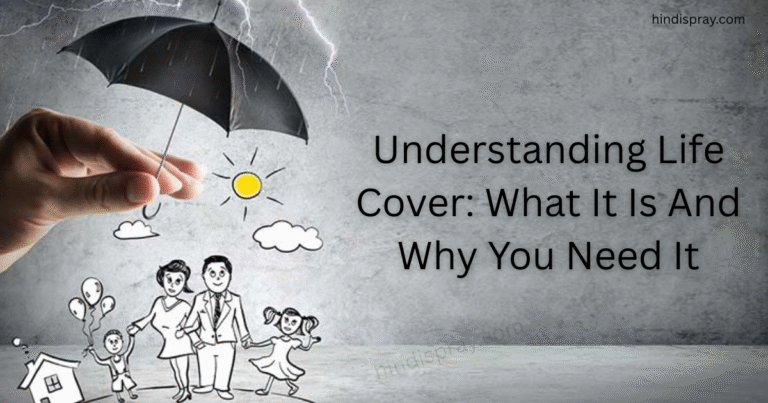Life is unpredictable. While no one likes to think about the worst-case scenario, planning for it is one of the most responsible decisions you can make for your family. One of the best ways to secure your loved ones’ financial future is through life cover. But what exactly is life cover? Why is it important? In this comprehensive guide, we delve into the essentials of life cover, its benefits, types, and why it should be a non-negotiable part of your financial planning.
What Is Life Cover?
Definition of Life Cover
Life cover, also known as life insurance, is a financial product that provides a lump sum payment to your beneficiaries in the event of your death. This payment can be used to cover daily living expenses, pay off debts, or fund future needs like education.
How It Works
When you purchase a life insurance policy, you agree to pay premiums regularly—monthly or annually. In return, the insurer promises to pay a predetermined amount (the sum assured) to your nominated beneficiaries upon your death, provided the policy is active.
Why You Need Life Cover
Financial Security for Dependents
One of the primary reasons for life cover is to provide financial stability for your family. If you are the breadwinner, your sudden absence could lead to significant financial strain.
Debt Repayment
Mortgages, personal loans, and credit card debts don’t disappear with your demise. Life cover ensures these financial obligations are taken care of, preventing your family from bearing the burden.
Income Replacement
Life insurance can serve as a substitute for the income you would have provided, ensuring that your family can maintain their current lifestyle.
Funeral and Burial Expenses

Funerals can be expensive. Life cover can alleviate the financial burden of funeral costs, allowing your loved ones to grieve without added stress.
Peace of Mind
Knowing that your loved ones will be financially protected can offer peace of mind, enabling you to focus on living your life fully.
Types of Life Cover
Term Life Insurance
This is the most basic and affordable type of life cover. It provides coverage for a specified term (e.g., 10, 20, or 30 years). If you die within this term, your beneficiaries receive the death benefit. If you outlive the term, the coverage ends with no payout.
Whole Life Insurance
Whole life insurance provides lifetime coverage. In addition to a death benefit, it accumulates cash value over time, which can be borrowed against or withdrawn.
Universal Life Insurance
This is a flexible permanent life insurance policy that combines the benefits of term and whole life insurance. It allows you to adjust your premiums and death benefits.
Endowment Plans
These plans pay out a lump sum either on death or after a specific term. They are often used for savings and investment purposes in addition to providing life cover.
Group Life Insurance
Often offered by employers, this type of insurance covers a group of people under a single contract. While convenient, the coverage amount may be limited compared to individual policies.
Factors to Consider When Choosing Life Cover
Age and Health
The younger and healthier you are, the lower your premiums. Insurers assess your risk level based on age, medical history, and lifestyle.
Financial Obligations
Evaluate your debts, monthly expenses, and future financial commitments to determine the appropriate coverage amount.
Family Needs
Consider the number of dependents and their financial requirements, including education and healthcare costs.
Policy Term
Choose a term that aligns with your financial goals—whether it’s until your children graduate or your mortgage is paid off.
Budget
While comprehensive coverage is ideal, it must be affordable. Choose a policy with premiums you can sustain over the long term.
Benefits of Life Cover
Tax Advantages
In many countries, life insurance premiums are tax-deductible, and the death benefit is tax-free for beneficiaries.
Estate Planning
Life cover can be a vital tool in estate planning, helping to pay estate taxes and ensuring smooth asset distribution.
Wealth Creation
Certain life insurance policies, like whole life or endowment plans, offer investment components that help in wealth accumulation.
Loan Collateral
Some life insurance policies can be used as collateral for securing loans.
Common Myths About Life Cover
“I’m Too Young to Need Life Insurance”
Starting early ensures lower premiums and longer coverage.
“I’m Single With No Dependents”
You may still have debts or aging parents who depend on you financially.
“My Employer’s Insurance Is Enough”
Group life insurance may not offer adequate coverage or continue if you leave your job.
“Life Insurance Is Too Expensive”
Term insurance is surprisingly affordable, especially when purchased young.
Steps to Get Life Cover
Assess Your Needs

Analyze your financial situation, liabilities, and future goals.
Compare Policies
Use online tools or consult with an advisor to compare different policies.
Choose the Right Insurer
Look for a company with strong financial ratings and good customer reviews.
Fill Out the Application
Be honest about your health, lifestyle, and occupation to avoid claim denial later.
Undergo Medical Examination
Some policies require a health check to assess your insurability.
Review and Finalize
Go through the policy terms carefully and keep a copy for your records.
Also Read: How To Use An Insurance Premiums Calculator To Save Money?
Conclusion
Life cover is more than just a financial product—it’s a promise to your loved ones that they will be taken care of even in your absence. Whether you’re young or old, single or married, employed or self-employed, life insurance should be a fundamental part of your financial portfolio. The peace of mind it offers, coupled with the financial protection it provides, makes it an investment worth considering.
FAQs
1. What is the best age to buy life insurance?
The best time is as early as possible. Younger individuals pay lower premiums and can lock in coverage for longer.
2. How much life cover do I need?
A general rule is 10-15 times your annual income, but it depends on your specific obligations and goals.
3. Can I have more than one life insurance policy?
Yes, you can hold multiple policies, which can be beneficial for diversified coverage.
4. What happens if I stop paying premiums?
If you stop paying, the policy may lapse. Some policies have a grace period or non-forfeiture options.
5. Is life insurance payout taxable?
In most cases, the death benefit is tax-free for beneficiaries, but it’s best to consult a tax advisor for specifics.

